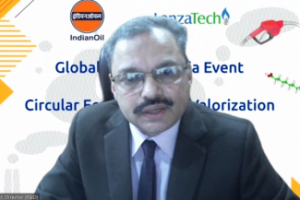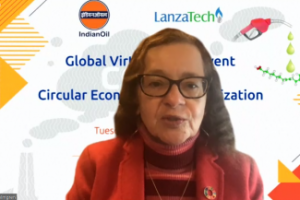Cutting edge carbon recycling technology has been developed over the last 6 years in India, that uses two basic ingredients, CO2 and H2, to produce sustainable fuels, chemicals and food for our daily lives.
The DBT-IOC Center for Advanced Bio-Energy Research (an entity co-funded by India’s Department of Biotechnology and IndianOil Corporation Limited) and LanzaTech, have been working on this platform since 2014 when they first demonstrated production of omega-3 fatty acids from CO2. Together, they have integrated two cutting edge technologies to enable direct conversion of CO2 to products.
The pilot plant results are extremely promising and significantly good translation has been achieved from lab to pilot scale.
Details about the DBT-IOC LanzaTech Pilot Plant:
The DBT-IOC Centre has put up the world’s first pilot facility at IndianOil R&D, Faridabad to sequester about 10 kg/day of CO2. This technology has also wide recognition including US, EU & Japan patents. IndianOil & LanzaTech bagged the Game Changer Company of the year award instituted by (erstwhile) Petrofed in the year 2015 for this novel integrated process.
Currently, most of the production of Omega-3 fatty acid esters is from fish oil which uses huge quantities of wild fish as feed, contributing to an overfishing crisis and threatening global food security & biodiversity. By the year 2025, the market for Omega-3 fatty acid esters derived products is projected at about 100 thousand tons per annum (~ US$ 57 billion). Commercial grade DHA esters price ranges from US $500-$1200 per Kg depending upon its purity.
This novel 3rd Generation bio-fuel technology has demonstrated the tremendous potential of CO2 sequestration /carbon recycling. This technology is expected create a platform that can produce sustainable food and fuels economically and at commercial scale. This disruptive technology is expected to give IndianOil a distinct lead over competition in not only reducing carbon emissions but also producing high value products such as DHA and Biodiesel. Once proven at pilot scale, this technology has a potential to be a game changer for IndianOil. The Corporation plans to put up commercial plants at suitable refinery locations / 2G ethanol plants where pure CO2 is available from the Mono Ethyl Glycol / 2G ethanol fermentation units and hydrogen from refineries.
Conversion of CO2 requires an energy source, such as the sun for plants, electricity or hydrogen. Using electricity or hydrogen only makes economic and environmental sense when 100% renewable electricity sources are used. That means that this technology will benefit from the continued price reductions and capacity increases for renewable electricity. Green hydrogen is produced with low cost renewable power and zero emissions and plays a key part in CO2 conversion. India is currently on track to exceed its targets for renewable power generation capacity by 2030 with the levelized cost of solar power generation falling below the cost of coal in 2018, making this an ideal location for the scale up of this CO2 platform.
This work builds on LanzaTech’s existing commercial experience in converting industrial emissions into sustainable fuels (including aviation fuel) and chemicals for consumer goods.

“The technology developed by Indian Oil, Department of Biotechnology, and LanzaTech for converting CO2 to lipids will be pathbreaking for sustainable production of biodiesel and high-value Omega3 fatty acids through carbon recycling”, said Shirkant Madhav Vaidya, Chairman of IndianOil during his address at a virtual media briefing on December 8.

“LanzaTech and the team from DBT-IOC have shown that we can take CO2, a liability for our planet, and combine it with 100% renewable hydrogen to create multiple products that we need and use every day,” LanzaTech CEO Dr. Jennifer Holmgren says. “Single use carbon must be a thing of the past. How can we afford to waste it, when we can make sustainable food, chemicals and fuels? We can’t go back now!”
Author
Freya Burton
Source
Lanzatech, press release, 2020-12-14.
Supplier
DBT-IOC Center for Advanced Bio-Energy Research
LanzaTech Ltd.
Share
Renewable Carbon News – Daily Newsletter
Subscribe to our daily email newsletter – the world's leading newsletter on renewable materials and chemicals









